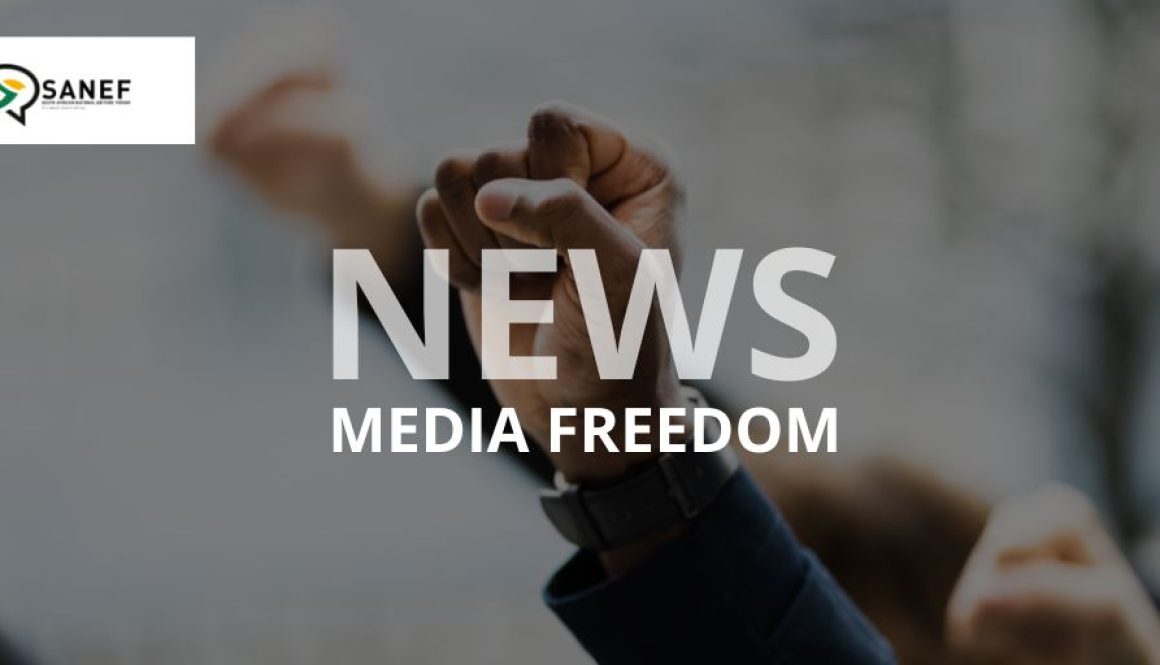Today the SA National Editors’ Forum commemorates Black Wednesday, the infamous day in 1977 – October 19—when the National Party government banned newspapers and journalists and also jailed a number of editors and journalists under detention without trial laws. SANEF’s commemoration this year focuses on President Jacob Zuma’s appeal for the urgent repeal or substitution of “old order legislation” affecting the admission of lawyers and advocates to the profession in the former “homelands”. It was made a few weeks ago when he addressed the annual general meeting of the Johannesburg Attorneys Association.
SANEF applauds the interest shown by President Zuma in the need for this apartheid-era legislation to be removed, especially when it is considered that South Africa has been a democracy for 18 years and the call is timely.
However, SANEF is disappointed that the President did not broaden his appeal to embrace a much wider field of apartheid and earlier law that restricts freedom of expressions and a free media and that remains on the statute book despite appeals by editors and journalists to previous presidents, Justice Ministers and officials to have these laws reviewed and scrapped or amended. Ten major laws have been listed as requiring urgent attention on the ground that they conflict with the Constitution. SANEF regards this as a first step, a precursor, to a wider review of laws affecting the media that conflict with the Constitution.
SANEF has noted the recent drive by the government to accelerate transformation in the media but points out that the repeal or amendment of these laws are an important part of transformation and the review sought by the journalists should be instituted urgently. SANEF has also noted that President Zuma recently called on the United Nations to restructure that body because its current composition and structures are outdated. SANEF believes those arguments also apply to the South African laws that affect the media and that it would be opportune for President Zuma to demonstrate his seriousness about restructuring the United Nations by embarking on an effective restructure of the laws journalists in his country complain about.
This is not a new campaign by SANEF though it is given added impetus by the excellent speech by our keynote speaker Dario Milo in outlining the effects of restrictive legislation on the media and the Constitutional structures such as the Constitutional Court that have exerted a powerful defence of media freedom values.
An extensive review of the laws referred to was instituted by the Freedom of Expression Institute in the 1990s and conducted by lawyers at the University of the Witwatersrand’s Centre for Applied Legal Studies who drew up a memorandum listing the important laws of immediate concern that should be tackled first before attention is given to less irksome laws which nevertheless should be amended or scrapped. The broad basis of the complaint is that these laws conflict with the Constitution which provides powerful protection for freedom of expression and freedom of the media.
Many statutory provisions that originated under apartheid and make profound incursions into the rights of freedom of expression and access to information have not been repealed despite the country having democratic dispensation for the last 18 years. There has of course been wide-ranging legislative reform of the law relating to access to information, but old laws in this area continue to languish on the statute books.
Our concerns have been raised with Presidents Mandela, Mbeki and Motlanthe, several Ministers of Justice and many meetings have been held with the Law Commissioners and officials of the Departments of Justice and Communications.
In 2008, there was a surge of hope when the SA Law Commission announced that it was to embark on a major review of the 2,800 laws that have been enacted since 1910 with a view to modernising and simplifying the statute book and removing those that are discriminatory or in conflict with the Constitution.
In welcoming the statement editors expressed the hope that the laws applying to the media would receive priority, basing that expectation on the fact that at least a decade earlier they presented the Law Commission with the Wits memorandum
The commission said experts from outside the commission would be appointed to assist and that a review of the statutes administered by the departments of transport, public works, treasury, foreign affairs, arts and culture and housing had already started.
Now, four years later, there is no indication what progress this commission has made. There has not been even a peep about media legislation.
The talks with the Department of Justice officials, on the other hand, have led to a proposal some months ago that workshops where the legislation will be reviewed be conducted with individual government departments which introduced, or are affected by, the legislation and journalists and their lawyers. This process, too, appears to have stalled. Our purpose in raising it today is to call on the government to get to grips with this issue and deal with it as a major priority, as, indeed, the media believes it is.
We urge the government to consider the positive results that could flow from such an exercise which would result in favourable publicity for the government. Also, given the unfavourable investment climate that South Africa is being subjected to because of the Marikana massacre and the general labour unrest brought on by other strikes, this reform would counter the negative view of the country. Indeed, this reform would have a major impact on the negative rating the international institution, Freedom House, has accorded SA.
Two years ago Freedom House downgraded South Africa from a “free” country, a fine rating it received when it transformed into a democracy, to a “partly free” one because of government hostility toward the press and impending restrictive legislation. This was a sad day for the continent’s most progressive and largest economy.
There can be no doubt that the legislative review journalists are seeking would persuade Freedom House and other freedom monitors that the government would be making the right moves to re-establish freedom of the press and so enable it to be awarded the prized “free” rating. This view of South Africa would be consolidated by the highly successful outcome of the discussions between the media and the Marikana Commission officials about the terms of accreditation of media coverage of the proceedings of that important institution. That result will certainly be seen as a plus factor for the South African government.
So what are we talking about? What does this memorandum contain that is so objectionable to the media?
The memorandum is critical of powers judicial officers have under various statutes to limit access to public trials and inquiries and turn them into secret hearings. The powers are too broad and archaic especially when a ruling is made on grounds of public morals being harmed and they restrict media freedom.
Some of the legislation is open-ended giving courts wide discretion to hold hearings in camera and in addition to restricting the media, it is potentially threatening to the rule of law. Limiting access to legal proceedings or banning publication of trial information should be an “act of last resort”. If limitation is required, it must be the minimum restriction possible to achieve the purpose.
The memorandum gives cogent arguments in favour of journalists being allowed to protect their confidential sources and to be able to plead a “just excuse” for not being forced to identify a confidential source.
The memorandum cites a series of national security laws which give wide powers to the president and others under broadly phrased legislative provisions to maintain secrecy over information. The National Defence Act 44 of 1957 has Section 118(1) (b), a famously absurd provision that should be repealed. It provides: “No person shall publish in any newspaper, magazine, book or pamphlet or by radio or any other means any statement, comment or rumour relating to any member of the South African Defence Force or any activity of the South African Defence Force or any force of a foreign country, calculated to prejudice or embarrass the government in its foreign relations or to alarm or depress members of the public, except where publication thereof has been authorised by the Minister or under his authority”.
The two lawyers say there is a dire need for comprehensiveness and consistency on the meaning of national security in terms of the Constitution and point out that five security laws dealing with the protection of information are too wide and constitute a substantial infringement on the right to freedom of expression and to obtain and disseminate information. These are the Armaments Development and Production Act 57 of 1968, the National Supplies Procurement Act 89 of 1970, which gives wide powers to the Minister of Industries, Commerce and Tourism, the Petroleum Products Act 120 of 1977 which gives similar wide powers to the Minister of Economic Affairs over the control of information, the National Key Points Act 102 of 1980 (which is to be supplanted by a new Act) and the Protection of Information Act 84 of 1982. This Act, say the lawyers, has harsh penalties and contains blanket restrictions on disclosure which take no account of the principles of openness and accountability.
They recommend the repeal or amendment of all five security Acts because they make unqualified incursions into freedom of speech and the right of access to information. South Africa’s security legislation should be appropriately drafted for an open democracy, they say.
Among the laws the lawyers say are restrictive is one passed by the government after 1994, the Promotion of Equality and Prevention of Unfair Discrimination Act, which aims to prohibit hate speech but has the unintended consequences of unreasonably restricting freedom of expression and having a chilling effect on editors because of uncertainties over the scope of the legislation.
Socials
Twitter: @SAEditorsForum
Email: [email protected]
Website: SANEF



